#bbc london
Explore tagged Tumblr posts
Text
A load of Porkies: Verlaine’s poetry and the French resistance on D Day 1944
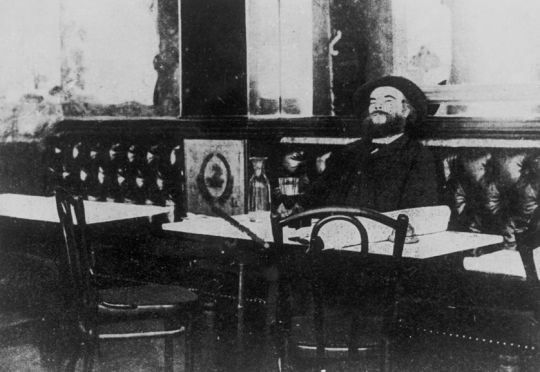
Les saglots longs Des violons De l'automne Blessent mon coeur D'une langueur Monotone.
- Paul Verlaine, Chanson d’automne (1866)
6 June 1944 marks the commemoration of the historic D Day landings in Normandy. Every year I exchange messages with family members, friends, and also some of my army veteran comrades with whom I served in the past. The simple messages of remembrance are a reminder to us of the sacrifices made by British and the Commonwealth, American, and the French on that fateful day when Allied forces stormed the beaches on Normandy.
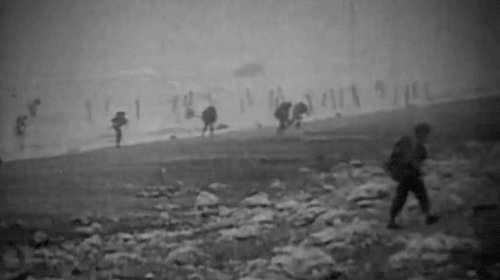
I remember receiving one post from an ex-veteran friend who flew with me. It was a picture of a local delicacy, Lincolnshire Chine, a traditional dish of cured pork and parsley only made in Lincolnshire, and a cryptic message underneath, ‘chanson d’automne’.
My friend is too witty for his own good sometimes and even I was stumped. He had read modern languages at Oxford and so was always prone to quoting French poetry at every opportunity, no matter how inappropriate the situation - like the time we were fortunate to have avoided a rocket attack from the Taliban but for some cool headed piloting and as we took a breather to thank God we made it out he bursts into poetry. He was (and still is) ferociously clever but wears it lightly behind his amiable character. It’s not surprising that our senior officers didn’t warm to his dry wit in the officers mess as he often lampooned the more boorish of the officer class that passed through our mess as guests. At heart he was a farmer and he longed to go back to his family farm lands in Lincolnshire after his time was up flying helicopters in the British army.
I nicknamed him Lucy after the great Roman patrician, soldier, and statesman, Lucius Quinctius Cincinnatus. Cincinnatus was the outstanding Roman military leader who displayed humility, loyalty, and modesty. At the height of his power and fame he displayed the highest civic duty by giving up everything to go back to his simple farm life - which in time became the Roman civic ideal. I still think the nickname suits my ex-comrade in arms very well.
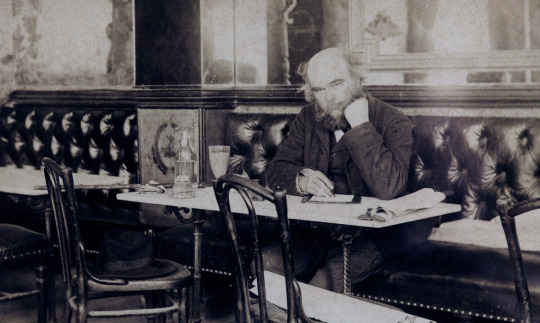
Drinking wine gives me moments of clarity and it slowly dawned on me what his cryptic message had meant.
Chanson d’Automne (1866) was a poem by the celebrated French poet, Paul-Marie Verlaine. His poem Chanson d’Automne (1866) is among the most beloved in French poetry. It captures his nostalgia for lost time in fewer words, and possibly just as well, as does Proust in six volumes.
Although it might have surprised Verlaine had he known it, the first lines of his poem were used by the British in the Second World War to signal the start of D-Day to the French resistance, which began the Allied invasion of Nazi-occupied France. D-Day (or "Operation Overlord") was a herculean planning task, requiring remarkable coordination both between the British, American, Free French, and Commonwealth armies, and with French resistance fighters on the ground, who were charged with helping aerial bombers disrupt German transportation routes, so as to impair the Germans' ability to send reinforcements.
But what had Paul-Marie Verlaine got to do with a side of cured pork from Lincolnshire?
Paul-Marie Verlaine lived and worked in Lincolnshire in 1875, teaching French, Latin and drawing at William Lovell's school. He had spent eighteen months in prison for shooting and wounding his lover Arthur Rimbaud and, when released in January that year, considered becoming a Trappist monk before deciding (the next best thing?) to become a school master in England. He came to London, registered with an employment agency and was soon heading north to this remote and, on the face of it, inhospitable backwater. Verlaine then spent a year as a schoolmaster in the village of Stickney, just north of Boston, Lincolnshire, in the mid-1870s and it is said that he became enamoured with this Lincolnshire delicacy. Verlaine continued to search for stuffed chine as he journeyed around Britain, but as is still the case today, he failed to find it outside Lincolnshire.
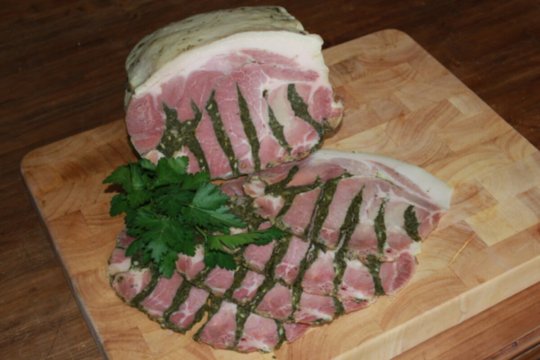
Unless you’re from Lincolnshire then the chances are you’ve never heard of stuffed chine. Unique to Lincolnshire, stuffed chine is a traditional dish made with cured pork and parsley. Once a county staple, its popularity has declined over the years as the younger generation looks to more modern cuisine and the older cuts are slowly forgotten. In the days before fridges and freezers, families would cure their meat to last them through the lean winter months. Each family would have a couple of pigs to kill - some of the meat would be salted and hung, and the rest used fresh.
Communities were tightly knit and there was often a friendly agreement between neighbours to stagger their kills and share fresh meat among the families, who then reciprocated when they in turn killed their pigs. Neighbours would pass on and receive this “pig cheer” all through the winter months while the pig killing went on, thus ensuring they always had fresh meat.
Once spring approached, however, they would look to use up some of the meat that had been salted and put away. Stuffed chine was traditionally served when the May Hiring Fair was in town (a kind of outdoor employment exchange, where people made themselves available for temporary work), and the largest chine was usually saved for Christenings – seeing a fresh row of parsley growing in a garden was often the sign that there was a baby on the way!
When the time came to use the chine it was soaked in cold water overnight, then carefully sliced from the spinal side towards the rind. Finely chopped parsley was packed tightly into the deep pockets in the flesh, then the joint was turned over and the process repeated on the other side. Next, the chine was very tightly wrapped up in muslin or an old pillowcase and simmered until cooked through. The cooked meat was left to cool still wrapped in cloth in order for it to set. Once completely cooled it was unwrapped, sliced thinly and served with a sprinkle of vinegar to cut through the fat.
Few butchers still use this traditional method as the cooked chine has to be carefully sliced by hand to avoid the bones, which due to the large bone-to-meat ratio makes it quite an expensive cut. For this reason many butchers choose to use collar bacon instead, which contains no bone and can therefore be sliced by a machine. There is something rather beautiful about the strips of pink salty pork divided by the flashes of punchy green parsley that immediately draws you in when you see it standing proudly in the butcher’s shop.
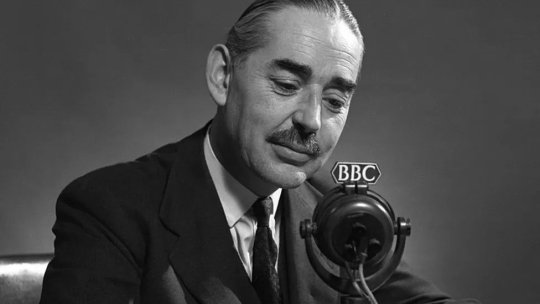
My ex-veteran friend’s witty post was a reminder how deeply immersed the British and the French (as well as the Germans) were in sharing a common currency of shared culture even in the bloody carnage of war. It was at 9.15pm French time on 5 June 1944, the opening notes of Beethoven's 5th, forming the Morse for V for Victory, sounded across the airwaves of BBC's Radio Londres into France. The speaker, Franck Bauer, read out personal messages that were known to individual Resistance groups in France. Hundreds of messages were sent out on the eve of the invasion, such as “Les carottes sont cuites” (The carrots are cooked), "La mélasse demain donnera le cognac" (Molasses tomorrow will bring forth cognac), and ““Jean a une longue moustache” (Jean has a long moustache).
But the most famous of all were verses from Verlaine's 'Chanson d'automne' destined for a Resistance group in central France. For the Resistance, these were a call to arms. All of these messages were picked up by the 15 Army listening post in Tourcoing, but although the Germans knew these messages were destined for the Resistance, they didn’t know their exact meaning. During the night of 5/6 June, the Resistance would carry out over 1,000 acts of sabotage, knocking out phone lines and blowing up railways, thus playing a vital and often overlooked role in the success of D-Day.

One of my favourite details of the whole D Day plan was how the Allies alerted the French that it was time to begin sabotaging rail-lines. On 1 June 1944, to tell the resistance to stand by for further alerts, the BBC transmitted the first three lines:
Les sanglots longs Des violons De l'automne
Per Arthur Symons' translation: "When a sighing begins / In the violins / Of the autumn-song".
The Germans wrongly believed that these lines were addressed to all Resistance circuits in France, and that when the next three lines were broadcast it would mean that invasion would follow within forty-eight hours. The lines were directed to a single Resistance circuit, Ventriloquist, working south of Orléans, instructing it to stand by for the next three lines, which would be the signal for it to carry out its railway-cutting tasks - in conjunction with the Allied landings.
Then, on June 5, to signal that sabotage efforts should begin, the next three lines were sent:
Blessent mon coeur D'une langueur Monotone
Symons: "My heart is drowned / In the slow sound / Languorous and long."
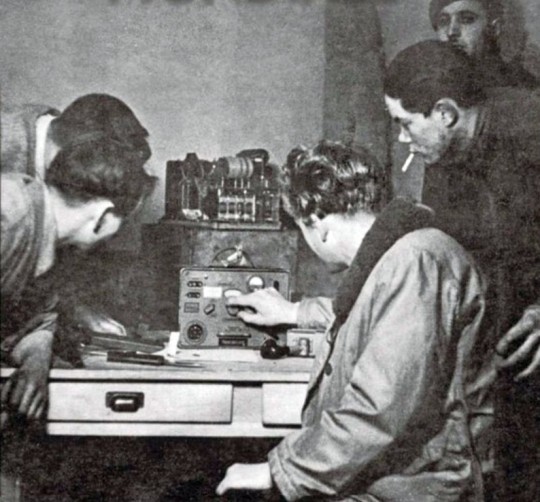
Both lines were intercepted by German forces, who took them as significant but didn't take adequate action; for one thing, they overestimated the scope of the sabotage operations to come. The second three lines of the Verlaine poem were broadcast over the BBC to the Ventriloquist Resistance circuit, instructing it to act at once in carrying out its railway-cutting sabotage. The SS Security Service radio interception section in Paris heard this as it was broadcast.
Believing, rightly, that the broadcast of the section of the poem was related to invasion, but wrongly, that it was an Allied call for railway sabotage throughout France, the Security Service immediately alerted the German High Command in the West.
An hour later, the German Fifteenth Army warned its various corps that intercepted messages pointed to an invasion within forty-eight hours (the parachute landings were fewer than three hours away). The German force responsible for most of the imminent assault area, the Seventh Army, which had received too many false warnings in the past, took no action.
The combination of airstrikes and ground sabotage proved extremely successful, especially as they wound up forcing the Germans to cross the Seine via ferry. The Germans ended up sending two panzer divisions all the way from the Russian front to fend off the invasion, but because of sabotage and bombings, it took less time to travel from the eastern front to France than it did for them to proceed from eastern France to Normandy.
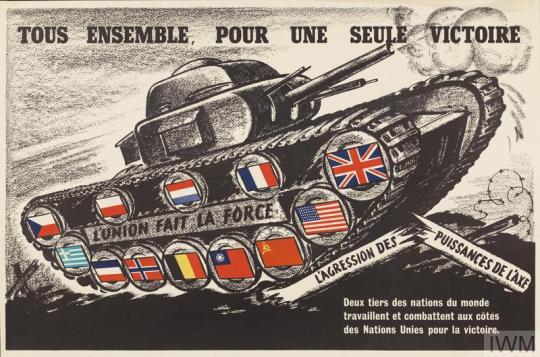
This is a good time as any to also point out at the Allied invasion of the Nomandy beaches would not have gone as well as they did without the help and support of the French themselves. I think there has been a skewering of perceptions that the D Day landings and the subsequent liberation of France was purely due to the Allied forces. What gets overlooked is the bravery and courage of the home grown French Resistance that played a crucial part also.
Truth be told as Allied soldiers stormed the beaches of Normandy on D-Day, 6 June 1944, the French Resistance were paving the way for their arrival. The French Resistance, the covert volunteers who had been struggling against the Nazis since 1940, leaped into action. They put their lives on the line as at no other time in the Second World War, risking everything to help the professional soldiers. This was their chance to liberate their country, and they seized it with both hands.
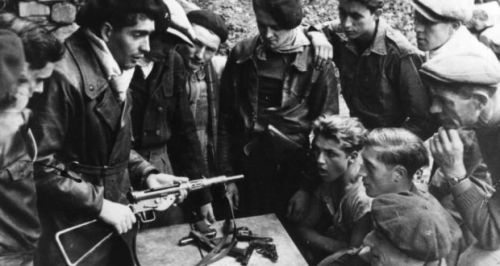
The French Resistance first emerged following the fall of France in 1940. With the nation’s armed forces shattered, some French people fled to Britain to remain free and continue the war. Most others bowed, with varying degrees of willingness, to the occupiers and the collaborating Vichy regime. But a few took another path, forming cells of spies and guerrillas who kept the hope of a free France alive. They provided intelligence to the Allies, sabotaged German facilities, and smuggled downed airmen and escaped POWs to safety.
The risks were incredibly high, and many Resistance members met horrible deaths at the hands of the Nazi regime. But their numbers kept growing, and by June of 1944, 100,000 Resistance members were waiting to rise up.
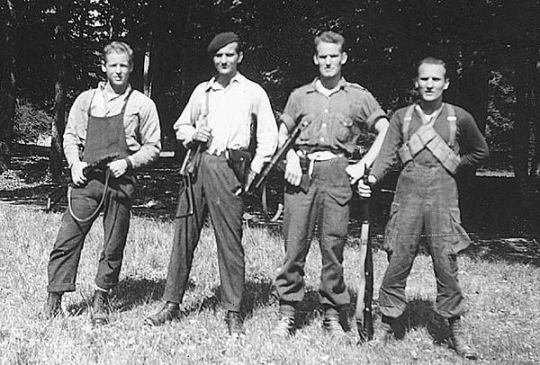
From the start, the Resistance had received support from elsewhere in the Allied camp. Britain’s Special Operations Executive (SOE), America’s Office of Strategic Services (OSS), and the exiled Free French forces under General de Gaulle had all made efforts to strengthen the volunteer force. They had forged connections with existing Resistance cells, fostered the growth of new ones, and provided them with supplies.
Perhaps the most important support the Allies gave came in the form of radio sets. These allowed the Resistance to more effectively coordinate with the rest of the Allies and with each other. Central to this was Radio London, a propaganda station the Allies used to keep hope alive in Europe. By transmitting pre-arranged code phrases in the personal messages part of its broadcasts, Radio London let Resistance members know about specific events, such as supply drops.
Immediately before D-Day, the Allies sent in the Jedburgh teams; three-man groups of Allied soldiers who were parachuted into France with radio sets. They joined up with Resistance cells, supporting them in their work and bringing them under Allied military leadership.
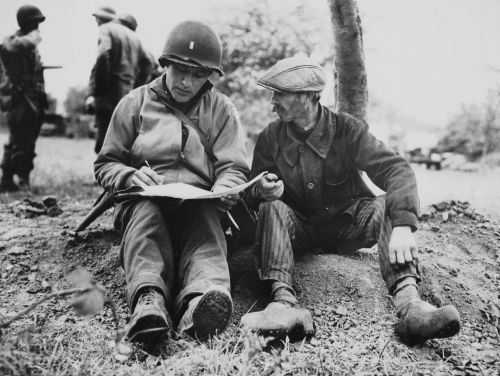
The Americans and British couldn’t afford to entirely trust the Resistance or even the Free French. Therefore, they kept details of the plans for D-Day from these critical allies until the last minute. In the lead-up to D-Day, signals told the Resistance that something was coming. They were encouraged to launch attacks on specific types of targets to prepare the way. At the start of June, a signal told them that the invasion was imminent, but when and where remained a closely guarded secret.
The Resistance carried out several distinct but related operations around D-Day: • Plan Vert – sabotaging the railway system. • Plan Tortue – sabotaging the road network. • Plan Violet – destroying phone lines. • Plan Bleu – destroying power lines. • Plan Rouge – attacking German ammunition dumps. • Plan Noir – attacking enemy fuel depots. • Plan Jaune – attacking the command posts of the occupying forces.
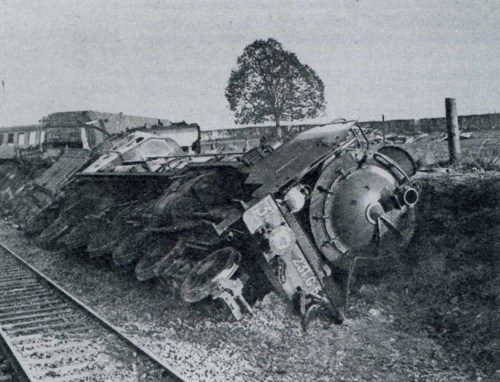
Some of these plans went active in the weeks leading up to the invasion. Plan Vert was particularly effective. Together with an Allied bombing campaign, the Resistance destroyed 577 railroads and 1,500 locomotives, three-quarters of the trains available in northern France. As part of Tortue, they also destroyed 30 roads and, again with British bombers, 18 of the 24 bridges over the northern stretch of the River Seine.
These attacks on the transport network were crucial to the success of D-Day. With trains out of action and roads ruined, the Germans struggled to get reinforcements to the front. The work of the Resistance crippled any potential for a significant counter-attack.
So on the night of 5 June 1944, when the crucial message arrived from Radio London, they knew attack was coming and more importantly they were ready. This is what they waited for since 1940, it was time for for Plan Violet. Across the country, they sprang into action, cutting phone lines and attacking communications centres. 32 telecommunications sites were destroyed in these attacks.
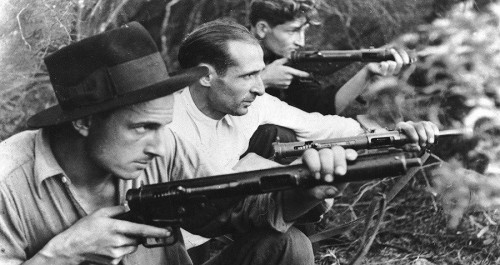
Emboldened by the Allies’ arrival, many Resistance cells went on a war footing. They ambushed German troops heading for the front. In some towns and villages, they killed or drove out the occupying authorities.
Close to the Allied landings, some of these operations were carried out in coordination with the SOE and Jedburgh teams, or with paratroopers who had landed behind German lines. As the regular forces advanced, the Resistance rose up to help and to punish the occupiers who had oppressed them for the past four years.
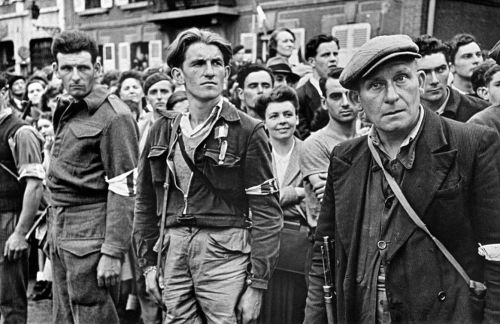
Unfortunately, this ended badly for some groups. Far away from the newly arrived armies, they lacked the support they needed to survive now that they had revealed themselves. Some of these groups were forced on the run. Others were killed weeks before the Allies could reach them. French leaders encouraged them to stand down and return to guerrilla operations until regular forces reached them, in hopes of saving lives.
Having understood the meaning behind my friend’s cryptic message of Paul Verlaine’s poem gave me pause for thought as I reflected on the bravery and the sacrifices made by all who took part in D Day, both on the beaches and behind occupied enemy lines.
The nature of war always reveals the true nature of those who fight. War, someone said, is not human nature, but a habit. We tell the dead to rest in peace, when we should worry about the living to live in peace.
So I messaged back to ‘Lucy’, my witty ex-comrade in arms, and quoted a stanza from Paul Verlaine well known poem, Crimen Amoris.
I knew ‘Lucy’ would understand that I understood his message on this most solemn of days to commemorate the bravery and sacrifices of the Greatest Generation through the prism of our own shared experience of war in Afghanistan:
Nous avons tous trop souffert, anges et hommes, De ce conflit entre le Pire et le Mieux. Humilions, misérables que nous sommes, Tous nos élans dans le plus simple des voeux.**
Too greatly have we suffered, angels and men, In this endless war between the Worst and the Best, Humiliated, unhappy have we been In darkling flights by the simplest vows addressed. ***
#essay#paul verlaine#verlaine#poem#D Day#DDay#Normandy#second world war#french resistance#british army#US army#invasion#allies#nazi germany#occupied france#france#french#war#sabotage#BBC london#violence#culture#personal
25 notes
·
View notes
Text
From BBC London, A very happy birthday to Baizhu!

Check out his birthday story with Qiqi and Frankie McCamley right here on Wattpad!
2 notes
·
View notes
Text
It's on the Computer ...
youtube
Post #235: YouTube, The Computer Programme, BBC London, Episode #4, It's on the Computer, storage & retrieval , 1980.
#Youtube#programming#basic#retro programming#vintage programming#education#basic programming#iloveprogramming#ilovebasic#gwbasic#ilovegwbasic#the computer programme#storage#bbc london#bbc
2 notes
·
View notes
Text
It's a whole load of nothing when new MP Irons appears on TV
Big break: Natasha Irons (centre), new MP for Croydon East, makes her debut on the BBC’s Politics London show. There probably won’t be a rush to get her back on It wasn’t just Keir Starmer who was being judged on his first 100 days in office. On Day 101 of her career as an MP, Natasha Irons popped up on our tellyboxes to dazzle us with her brilliance. Or not. Political editor WALTER CRONXITE…

View On WordPress
#BBC London#BBC Politics London#Croydon East#Merton#Merton Council#Natasha Irons MP#Samantha Simmonds
0 notes
Text
Craving it bad…
It’s been about two months since my last “session” and back to my vanilla life.
Normally after each session I spend a few days, maybe a couple weeks, disconnected from my sissy desires and living my usual routine.
There is always this point on which I fall back again in the well of cravings and to chatting with men online trying to find a good daddy that is local.
Every day since that point the desire goes up up up until I become obsessed. Honestly people do not understand how difficult it is to find a local daddy willing to be creative and go all the way… it is really difficult and I really try hard.
One day I will post after I have my first real experience and I am sure it will change me forever. Until then… I’m stuck craving it bad…

#sissy bitch#bbc sissy#beta sissy#faggot sissy#humiliation sissy#sissy caged#sissy tasks#sissy bottom#feminine sissy#london#naughty sissy#feminized sissy#humilated sissy#humiliated sissy#panty sissy#permanent sissy#sissy crossdresser#sissy clitty#sissy cd#sissy cumslut#sissy domination#sissy faggot cocksucker#sissy dress#sissy desires#sissy ferminization#sissy for daddy#sissy fuck toy#sissy for bbc#sissy gurl#sissy hypnotize
4K notes
·
View notes
Text


Got to meet Laurence Rickard and Mathew Baynton yesterday at MCM! They were so incredibly sweet! I gifted them each a print of my Ghosts illustration and they also signed it for me! ✨️
Someone also posted this gorgeous pic of mathew baynton on twt with my art right next to him hehe 🤭🤭

#they were seriously so damn nice#could've talked to them for ages#i forgot to take a picture with them cos I was already holding up the line#but im so grateful that they also signed my art for them since they had already signed the book#had a really successful london trip so far haha#bbc ghosts#ghosts
481 notes
·
View notes
Text

A FTH gift for @thegildedbee by helloliriels
'London really does look different from up here.'
36 Views of London
A patchwork image of John & Sherlock’s London, as seen through their eyes. This is Plot Without Plot (which I'm told is 'the good stuff') 😎😋📸. Meant to be taken in bite-size chunks, as such, I will be releasing one daily. It is a fully finished fic. I hope you enjoy!
@johnlocky @totallysilvergirl @friday411 @ghostofnuggetspast @chinike @rhasima @inevitably-johnlocked @sarahthecoat @7-percent @a-victorian-girl @lololollywrites @lisbeth-kk @kettykika78 @khorazir @calaisreno @therealsaintscully @arwamachine @discordantwords @safedistancefrombeingsmart @theofficialinternetloner @chriscalledmesweetie @raina-at @blogstandbygo @solarmama-plantsareneat @john-smiths-jawline @221beloved @meandhisjohn @gaylilsherlock @meetinginsamarra @loki-lock @peanitbear @sgam76 @janetm74 @shiplocks-of-love @naefelldaurk @ninasnakie @whatnext2020 @strawberrywinter4 @dragonnan @thetimemoves @jbaillier @catlock-holmes @anyway-kindness @londonlock @topsyturvy-turtely @smalltimenerd @justanobsessedpan @aquilea-of-the-lonely-mountain @hasenkind687
#36 Views of London#FTH 2024#bbc sherlock#johnlock#helloliriels#plot without plot#perpetual pining with a dose of fluff#random glimpses#slice of life#happy ending guarantee#for thegildedbee#with love
355 notes
·
View notes
Text

Doctor Who's Tom Baker as the Doctor filming links for the BBC series Disney Time (UK, 1964-95), London, England, 1975.
732 notes
·
View notes
Text
bob & sara dylan, heathrow airport, london, england, 1969. video courtesy of bbc archives
87 notes
·
View notes
Text
Sherlock and John left me the stage today, so I got a chance to thank you.
I started the edits as a joke, and months later, I find myself preparing Halloween, a Johnlock wedding,cases, and many ideas more.
Being creative and getting the chance to share it is more than a gift.
It is a treasure, and it is made by you!
See you on Monday when the Halloween journey starts:)

@totallysilvergirl @thepolyamorywriter @helloliriels @lisbeth-kk @a-victorian-girl @jobooksncoffee @peanitbear @naefelldaurk
#bbc sherlock#sherlock holmes#john watson#benedict cumberbatch#martin freeman#johnlock#sherlock#headcanon#edits#221b baker street#london#feeling grateful#sherlock fandom
88 notes
·
View notes
Text


Holly Humberstone on opening for Taylor Swift's The Eras Tour in London:
''I have a strange mix of like nerves and pure thrill to be honest. I'm so excited just to even be on Wembley. I love that she's supporting mostly female and non-binary people to open for her. It feels like a really nice space to celebrate female artists as well and just kinda girl power. To be a part of that group is such an honor and I just wanna kinda do it justice and play the best show that I can play. Who knows if I get to meet her tomorrow, I don't know. Yeah, she's the queen. I don't know what I'd say to the girl. I've gotta deliver but I also gotta remember to have fun and make the most of it.'' (Via BBC News)
(August 16, 2024)
#taylor swift#holly humberstone#interview#bbc news#august 16#the eras tour#the eras tour london#taylorswift
112 notes
·
View notes
Text
I’m re-watching BBC’s “Sherlock” for the first time in ages, and I must say, 12 year old me had immaculate taste and was soooo right when she decided to fall in love with Benedict Cumberbatch.

#sherlock holmes#bbc sherlock#benedict cumberbatch#he’s so handsome#johnlock#london#Moriarty#sherlock fandom#sherlock x john
263 notes
·
View notes
Text
Sherlock Holmes Pub in London
Whenever I am in London I go to the Sherlock Holmes Pub in Northumberland Street near the Strand, close to National Gallery etc. Most of the times I drink a half pint of Sherlock House Ale.
Some highlights:






When you have the opportunity (and money and time) go upstairs to dine. The food is good, and the Sherlock Holmes memorabilia is even more spectacular. Yes, it’s partly a tourist spot — but Sherlock Holmes, so it’s fun.
100 notes
·
View notes
Text
Computer Literacy Project 1980 - 1989 ...

Post #200: BBC CLP, Computer Literacy Project 1980 - 1989, London, UK, 2023.
5 notes
·
View notes
Text
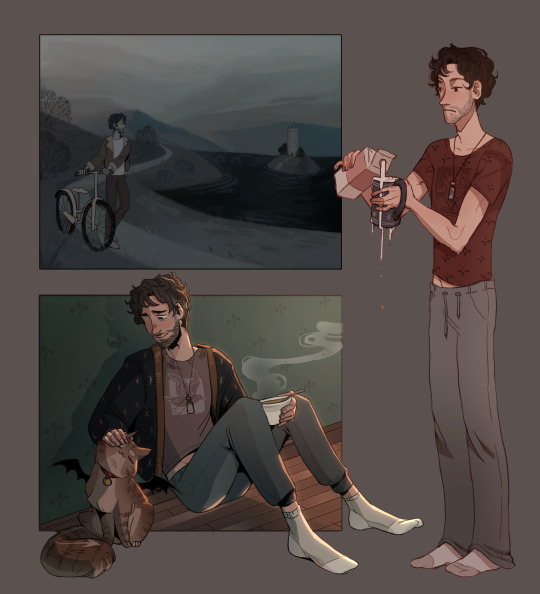
merlin fanart?????? in 2023????????
more context for these in the tags
#OK SO this is like my silly little 1500 years later au i have running in my head#where merlin is a sad old man wizard living in an eclectic townhouse in london#he and kilgarrah sorta made up cuz who else is there to talk to after 1500 years#he keeps kilgarrah in a cat body tho to keep him in check#he lets himself age between like 25 and 45#then he'll wind it back before his joins start hurting too much lol#old man#ok that's it for now! might doodle more for this au later teehee#merlin#merlin bbc#merlin emrys#merlin fanart#kilgarrah
384 notes
·
View notes
Text
Oh my…
from experience, I recommend realistic cock dildos, they are increíble for mind conditioning as well as for stretching.

#bbc sissy#beta sissy#humiliation sissy#faggot sissy#sissy bottom#london#sissy caged#sissy tasks#sissy hypnotize#dominated slave#dildosextoys
700 notes
·
View notes